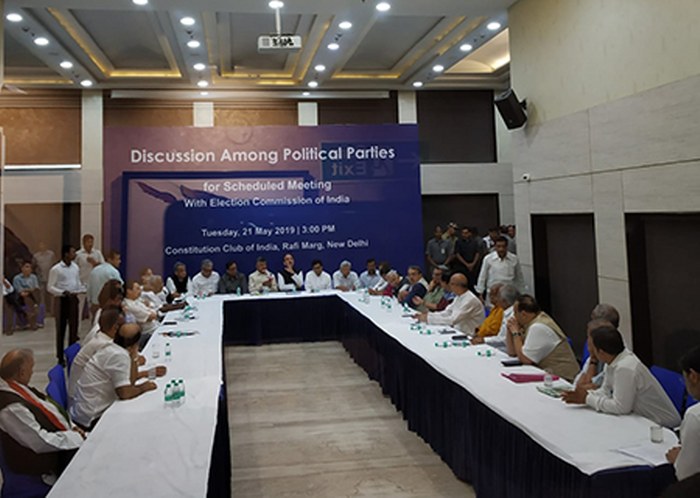


Ahead of the much-awaited counting day, Congress leader Bhupesh Baghel and Samajwadi Party leader Akhilesh Yadav took to social media to express concerns over alleged discrepancies in EVM numbers in Chhattisgarh and Uttar Pradesh, respectively. While Baghel claimed that thousands of votes could be affected due to the changed EVM numbers, Yadav alleged that police and district administration in UP were detaining Opposition party workers. The Election Commission refuted the allegations, but the Opposition remains optimistic about a potential recovery in certain states.
Concerns Raised Over EVM Discrepancies in India
Ahead of India's highly anticipated general election counting day, concerns have emerged regarding alleged discrepancies in Electronic Voting Machines (EVMs). Opposition party leaders have voiced their apprehensions, prompting a response from the Election Commission of India (ECI).
Allegations and Responses
Chhattisgarh:
Congress leader Bhupesh Baghel alleged that EVM numbers had changed in Chhattisgarh, potentially affecting thousands of votes. The ECI denied these claims, stating that EVM numbers were not changed and that all votes were cast transparently.
Uttar Pradesh:
Samajwadi Party leader Akhilesh Yadav accused the police and district administration in Uttar Pradesh of detaining Opposition party workers. He further alleged that EVMs were being transported in suspicious circumstances. The ECI also dismissed these allegations, asserting that law enforcement agencies were acting in accordance with electoral regulations.
Opposition's Optimism
Despite the ECI's rebuttals, the Opposition remains optimistic about potential gains in certain states. They contend that issues with EVMs and alleged suppression of their workers could lead to a more favorable outcome in their favor.
Background on EVM Concerns
Concerns over EVM reliability have been raised in the past. In the 2019 general election, Opposition parties alleged irregularities with EVMs, triggering a series of legal challenges and protests. The ECI has consistently maintained that EVMs are secure and tamper-proof, but the controversy persists.
Top 5 FAQs on EVM Discrepancies
1. What are EVMs?
Electronic Voting Machines are electronic devices used to record votes in elections. They are intended to increase efficiency, prevent fraud, and eliminate human errors associated with manual voting systems.
2. Have there been any proven cases of EVM tampering?
No credible evidence has emerged to prove that EVMs have been tampered with in Indian elections. The ECI conducts rigorous testing and audit procedures to ensure the integrity of these machines.
3. Why do EVM numbers change?
EVM numbers may change for administrative or technical reasons, such as redeployment or calibration. The ECI verifies these changes through multiple levels of security and ensures that no votes are lost or compromised.
4. What is the process for addressing EVM concerns?
Concerns about EVMs can be raised with the ECI. The Commission investigates all allegations and takes appropriate action based on evidence.
5. What are the safeguards in place to prevent EVM fraud?
EVMs are designed with multiple security features, including tamper-proof seals, cryptographic protocols, and independent verification mechanisms. The ECI also deploys a team of technical experts to supervise the entire voting process.

Government officials in the UK are facing backlash from citizens as Storm Bram brings heavy rain and winds, leading to flood warnings and potential risks to life. Good Morning Britain presenters Richard Madeley and Susanna Reid raised concerns about the lack of warning to those living in affected areas, while viewers expressed frustration over inconsistent warning systems. With severe weather conditions expected to continue throughout the country, citizens are calling for better communication and preparation from their government.

A shocking conspiracy was uncovered by the Bihar Police when they arrested an individual from Bhojpur for allegedly issuing death threats to MP Pappu Yadav. The whole scheme was concocted by his close associates to garner enhanced security for Yadav. The arrested man, Ram Babu, has confessed to making a threatening video at the behest of the MP's associates, who had promised him a position in their party. Police are still investigating the instigator of this plot and are also looking into other aspects of the case.

Congress-led UDF emerged as the leading force in the Kerala local body elections, securing a majority in 505 out of 941 Grama Panchayats. Meanwhile, the BJP-led NDA made significant gains, winning the Thiruvananthapuram Corporation for the first time and retaining key municipalities. Union Home Minister Amit Shah credited the victories to PM Narendra Modi's leadership and vision for "Vikasita Keralam".

In a significant victory for the Aam Aadmi Party (AAP), three women candidates secured seats in the Kerala local body elections. Former Mayor and MCD AAP Councillor Dr. Shelly Oberoi congratulated the winners, praising their success as a strong example of women's empowerment. Meanwhile, Congress president Mallikarjun Kharge expressed his gratitude to the people of Kerala for giving a decisive verdict in favor of the United Democratic Front (UDF), while Prime Minister Narendra Modi acknowledged and praised the efforts of BJP workers in the state. This outcome reflects the increasing support for female leaders and potentially hints at a greater shift towards progressive politics in the state.

As the counting for the local body elections in Kerala began, the Congress-led UDF is in the lead in most of the city and town local bodies. This two-phase election, held on December 9 and 11, has seen a high voter turnout of over 70%. The results of this election will have a significant impact on the political landscape ahead of the 2026 Assembly elections in Kerala, with local body results often reflecting voter mood. Congress president Mallikarjun Kharge has expressed confidence in the UDF alliance's chances in the upcoming Assembly polls.

R Sreelekha, the former DGP and BJP's mayoral candidate in Thiruvananthapuram Corporation, secured a victory in the Sasthamangalam ward and pledges to deliver a corruption-free administration if given the chance to serve the public. Other notable victories in the corporation elections include former district president VV Rajesh and UDF mayoral candidate KS Sabarinathan. However, some high-profile defeats were seen, including actor Poojapura Radhakrishnan and Congress leader Johnson Joseph. Independent candidate Pattoor Radhakrishnan and Congress candidate Mary Pushpam also emerged victoriously in their respective wards.

According to sources, the Special Intensive Revision (SIR) exercise in West Bengal has identified a total of 58,80,202 voters who may be excluded from the draft voter list. This includes people who have passed away, transferred, missing, and identified as 'fake' by the Election Commission. These numbers are subject to change in the final list, which is set to be published on February 14, 2022. The commission has divided voters into three categories - own mapping, progeny mapping, and non-mapping - depending on their presence in the 2002 voter list. Those not falling into any of these categories will be called for a hearing by the EC.

In a significant shift in voter sentiment, the Congress-led United Democratic Front (UDF) is set for a decisive win in the Kerala local body elections, dealing a major setback to the ruling CPM-led Left Democratic Front (LDF) ahead of the 2026 Assembly elections. The UDF has consolidated its gains across urban local bodies, while the LDF's last-minute welfare push failed to curb anti-incumbency. The NDA also made significant gains, underlining its expanding presence in urban Kerala.

In a major upset, the BJP-led NDA has won the Thiruvananthapuram Municipal Corporation, ending the CPI(M)-led LDF's 45-year reign. The victory, with the NDA winning 50 out of 101 seats, is a boost for BJP's aspirations in Kerala's upcoming Assembly elections. The party's strong focus on development and Hindutva in Thiruvananthapuram, under the leadership of state unit president Rajeev Chandrasekhar, proved successful despite challenges faced during the campaigning. This victory has put the BJP in a strong position for the 2021 Assembly elections.

The Bharatiya Janata Party-led National Democratic Alliance (NDA) has taken a huge lead in Thiruvananthapuram Municipal Corporation, giving a setback to the ruling Left Democratic Front (LDF). Initial trends show the NDA leading in 25 wards, while the LDF is ahead in 15 wards and the UDF in 10 wards. This is a major blow to the LDF ahead of the upcoming assembly elections in Kerala, with a record voter turnout of 73.69%. The State Election Commission has also commended the peaceful conduct of the elections.